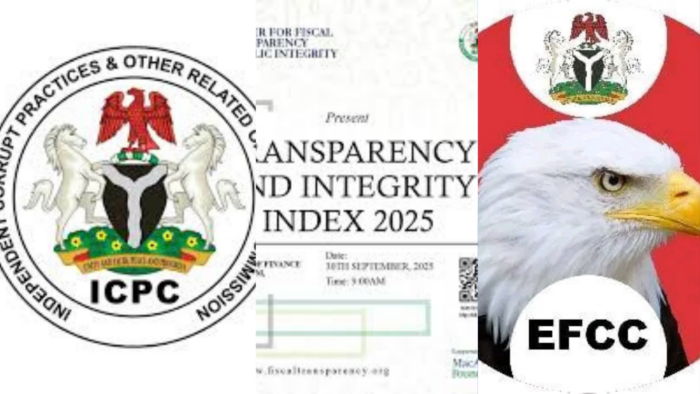The National Oil Spill Detection and Response Agency has emerged as the most transparent public institution in Nigeria, beating 575 other Ministries, Departments and Agencies (MDAs) accessed securing a total of 78.84 per cent.
This is according to the 2025 Transparency and Integrity Index report presented in Abuja by the Centre for Fiscal Transparency and Public Integrity.
Presenting the report, the Executive Director of the Centre, Umar Yakubu, noted that public institutions were statutorily required under the Fiscal Responsibility Act (2007), the Freedom of Information Act (2011), and the Public Procurement Act (2007) to publish information such as budgets, procurement details, recruitment policies, audit reports, and anti-corruption frameworks.
The breakdown of the report shows that the Nigerian Investment Promotion Commission came second with 78.21 per cent, while the Independent Corrupt Practices and Other Related Offences Commission scored 78.13 per cent to make the third most transparent agency.
ICPC’s score of 78.13 per cent across various criteria is a testament to the anti-graft agency’s practice. However, this success raises the question of why the Economic and Financial Crimes Commission is missing from the top spot in the list.
The statement reads, “NOSDRA, NIPC, ICPC top 2025 Transparency Index as Over 500 MDAs Rank Low.
“The National Oil Spill Detection and Response Agency (NOSDRA) has been rated as the most transparent public institution in Nigeria, according to the 2025 Transparency and Integrity Index (TII).
“In the report unveiled in Abuja by the Centre for Fiscal Transparency and Public Integrity (CeFTPI), NOSDRA led all 575 assessed Ministries, Departments and Agencies (MDAs) with a score of 78.84 per cent.
The Nigerian Investment Promotion Commission, came second came second with 78.21 per cent, while the Independent Corrupt Practices and Other Related Offences Commission scored 78.13 per cent to place the third most transparent agency.
“However, most federal institutions scored poorly in the report, with many falling below the 50 per cent benchmark for average on openness, accountability, and compliance with statutory disclosure requirements.
“While presenting the report, the Executive Director of the Centre, Umar Yakubu, noted that public institutions were statutorily required under the Fiscal Responsibility Act (2007), the Freedom of Information Act (2011), and the Public Procurement Act (2007) to publish information such as budgets, procurement details, recruitment policies, audit reports, and anti-corruption frameworks.”
Read Also
The statement further disclosed that “according to the Centre, the index was conceived to strengthen integrity mechanisms in Nigeria’s public sector by assessing whether MDAs publish vital information on their websites and portals as required by law.
“The assessment focused on five key variables, namely, financial transparency, procurement, human resources and inclusion, control of corruption, and citizen engagement, with each attracting 20 per cent.”
Also in the statement, a review of the report showed that out of 575 public institutions assessed, only six crossed the 50 per cent average threshold.
Apart from the earlier listed agencies, Development Bank of Nigeria (62.60 per cent), Tertiary Education Trust Fund (54.12 per cent) and Bank of Industry (51.29 per cent) were ranked 4th, 5th and 6th respectively.
“Conversely, over 400 institutions scored within the range of 36 and 10 per cent, with no evidence of publishing basic governance information online,” the statement added.
The statement further sounded an alarm, “that about 100 institutions recorded below 10, while nine institutions scored zero.
“This means that they failed to publish any of the required information on budgets, procurement, staffing, or anti-corruption policies.
“Many of these included federal colleges, polytechnics, teaching hospitals, and river basin authorities.”
The report also checked other ministries, like, “Nigerian Coal Corporation, Federal Government staff Housing Loans Board, Federal Medical Centre Katsina, Federal College of Freshwater Fisheries Technology, Baga, Hadrian-Jama’are River Basin Development Authority, and Metallurgical Training Institute, Onitsha scored zero in the ranking.
“Also, key ministries fared poorly. The Ministry of Agriculture and Rural Development, the Ministry of Water Resources, Ministry of Youth and Sports Development were graded zero.”
The report further check other ministries scoring about the 10 percent threshold, “The Ministry of Power (21.0 per cent), the Ministry of Works and Housing (14.50 per cent), Ministry of Health (14.50 per cent), and Ministry of Defence (14.50 per cent) ranked low, which further highlighted persistent opacity in sectors critical to Nigeria’s development.”





